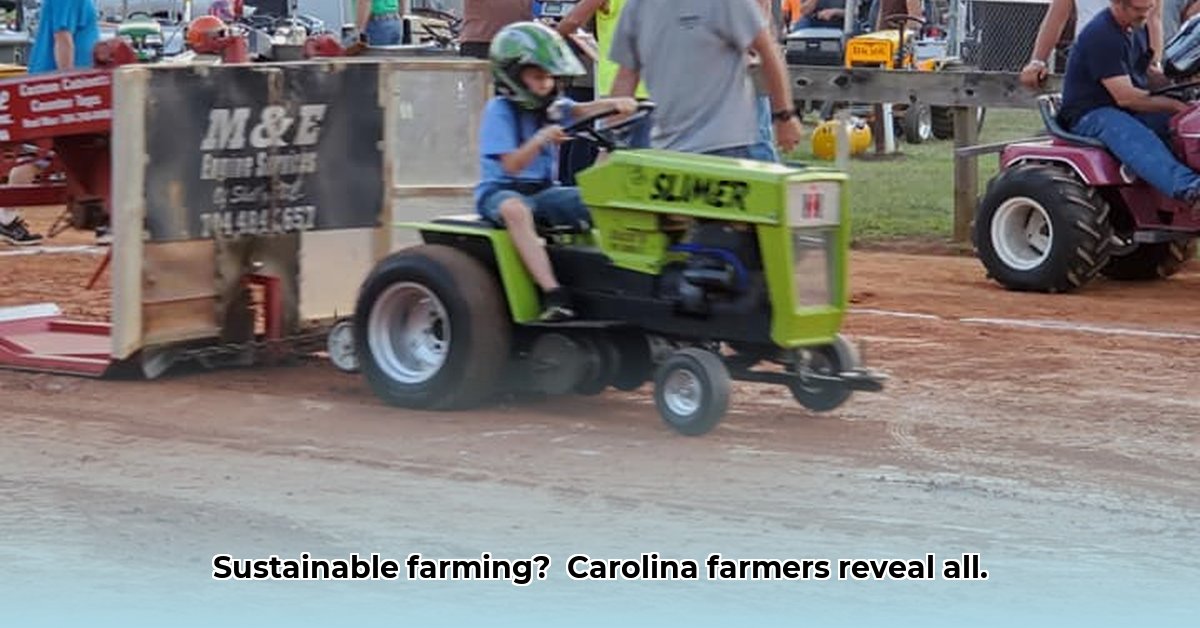
Unveiling Unexpected Sustainability in Agriculture
It's a common misconception that powerful machinery and environmental responsibility are mutually exclusive. However, the Carolina Truck & Tractor Pullers are challenging this notion, quietly enacting significant positive changes in sustainable farming practices. This article will explore their surprising contributions to a greener future in agriculture. For more information on agricultural resources, check out this helpful resource.
Beyond the Roar: Precision Agriculture and Efficiency
The image of roaring engines and dust clouds associated with tractor pulls might seem at odds with environmentally friendly farming. Yet, beneath the excitement of competition, many participants apply precision agriculture techniques honed through their involvement with powerful machinery. Years spent optimizing engines for peak performance translate directly to optimizing farm machinery. This means less fuel wasted, reduced emissions, and a smaller environmental footprint per acre.
"The precision required in tractor pulling directly translates to precision farming," says Dr. Emily Carter, Agricultural Engineer at NC State University. "These pullers are already experts in optimizing machinery for performance, and this expertise is easily applicable to minimizing fuel consumption and maximizing efficiency on the farm."
Fueling a Greener Future: Biodiesel and Beyond
Some Carolina pullers are actively exploring alternative fuel sources, such as biodiesel, made from renewable resources like vegetable oils and animal fats. This shift significantly reduces reliance on fossil fuels, demonstrating a tangible commitment to environmental sustainability, both on and off the competition track.
Knowledge Sharing: A Community Committed to Sustainable Practices
The Carolina Truck & Tractor Pullers community goes beyond competition; it fosters knowledge sharing. They actively organize workshops and demonstrations showcasing environmentally friendly farming techniques, including soil health management, precision irrigation, and conservation tillage. This knowledge sharing extends beyond the immediate community, impacting a broader network of farmers. This collaborative spirit transforms competitors into partners in a common cause. Isn't this a powerful example of how a community can work together to achieve a shared goal?
Precision, Power, and Partnership: A New Approach to Sustainable Farming
The Carolina Truck & Tractor Pullers showcase a unique blend of passion, power, and precision. Their dedication to sustainable agriculture demonstrates that a love of powerful machinery doesn't preclude environmentally responsible practices. Their methods offer valuable lessons for other agricultural communities. How can we further replicate and improve these innovative approaches?
Challenges and Future Directions
The adoption of alternative fuels and sustainable practices presents challenges. The transition to biodiesel, for example, often involves higher initial costs, potentially hindering adoption by some farmers. However, ongoing research and development are crucial for maintaining momentum and addressing these barriers.
"Continued research into alternative fuel sources and efficient farming techniques is vital for long-term sustainability," states Dr. Michael Davies, Agricultural Economist at Clemson University. "Addressing the upfront costs associated with some of these practices will be crucial to widespread adoption."
Implementing Low-Cost Precision Irrigation in Arid Regions: A Step-by-Step Guide
Key Takeaways:
- Precision irrigation dramatically increases water use efficiency.
- Low-cost methods, like drip irrigation and rainwater harvesting, are viable options for resource-constrained farmers.
- Technology integration should prioritize practicality and ease of use.
- Community involvement is vital for long-term success.
Here’s a practical approach to implementing low-cost precision irrigation:
- Assess Needs and Resources: Carefully evaluate your land, budget, and water sources.
- Choose Low-Cost Methods: Prioritize efficient techniques like drip irrigation and rainwater harvesting.
- Integrate Simple Technology: Use basic tools like water flow meters and timers to enhance water management.
- Foster Community Engagement: Organize workshops & training to share knowledge and build capacity.
By following these steps, farmers can effectively implement cost-effective and sustainable irrigation systems, maximizing productivity even in challenging environments.